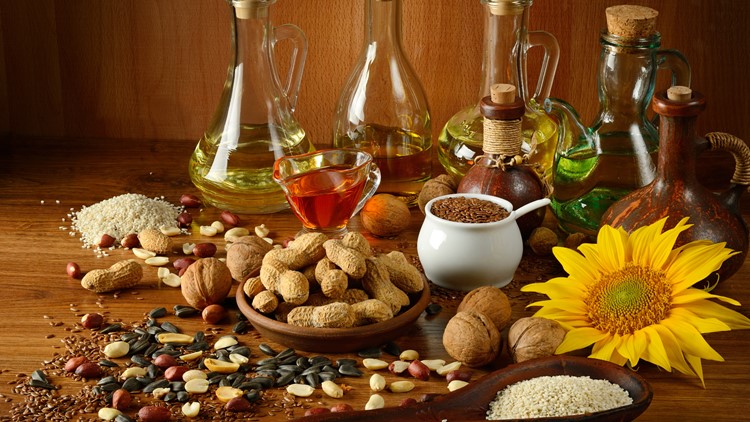Cooking oils are a staple in nearly every kitchen pantry and are often used as an alternative to butter. There are different types of cooking oils – some are vegetable oils, like olive or avocado oil, while others are considered seed oils.
The most common types of seed oils are canola, corn, cottonseed, soy, sunflower, safflower, rapeseed and rice bran oils. Those oils are still considered a type of vegetable oil but were created, or refined, using the seeds from plants.
To provide a comparison, olive oils are not considered a seed oil because the oil is created by pressing whole olives, while sesame oil is created from pressing the sesame seeds.
Seed oils and how they impact health have been a subject of controversy for years. Some videos posted on TikTok claim seed oils are bad for your health.
Eight common seed oils are known in some health circles as the “hateful eight.” The oils have been called toxic in some videos or have been blamed for obesity, chronic inflammation and heart disease.
But some people have posted rebuttals, saying seed oils are actually not as harmful as some claim.
THE QUESTION
Are seed oils unhealthy?
THE SOURCES
- Beth Czerwony, a registered dietician with Cleveland Clinic
- Melissa Prest, a registered dietitian, nutritionist and spokesperson for the Academy of Nutrition and Dietetics
- An article published by the American Association of Cancer Research
- Centers for Disease Control and Prevention (CDC)
- An article published by Colorado State University’s Kendall Reagan Nutrition Center
- U.S. Dietary Guidelines for Americans
- American Heart Association
- A review of 30 studies published in 2019 in the medical journal Circulation
- A review of 15 clinical trials published in 2014 in Missouri Medicine
THE ANSWER
No, seed oils are safe to consume in moderation.
WHAT WE FOUND
Seed oils are perfectly healthy to use in home cooking and food preparation, like in a salad dressing, as a marinade or in baking, our experts said, since they are often healthier than alternatives like butter.
However, seed oils are often present in ultra-processed foods like some packaged snack foods, fast food or deep-fried foods. Those foods are unhealthy when consumed in excess, according to an article published by the Cleveland Clinic.
The healthy side and science of seed oils
Melissa Prest, a registered dietitian with the Academy of Nutrition and Dietetics, said if you’re using seed oils at home, like for a salad dressing or in baking, there is no associated health risk in doing that.
Seed oils, like canola oil, are recommended over butter or shortenings when sautéing, grilling, roasting or stir-frying foods because they are higher in polyunsaturated fat, which is considered “heart healthy,” according to the Centers for Disease Control and Prevention (CDC) and the current U.S. Dietary Guidelines for Americans.
What are polyunsaturated fats?
Polyunsaturated fat is a type of dietary fat and is one of the healthy fats. Whether something is considered a polyunsaturated fat is determined by the food’s content of omega-3, omega-6 and omega-9 fatty acids, according to an article published by Colorado State University’s Kendall Reagan Nutrition Center (KRNC).
According to that article, seed oils tend to be higher in omega-6 fatty acids, which is why critics on social media say they are bad for your health. But experts say that’s not true; omega-6 fatty acids are a vital part of your diet.
The article published by KRNC says omega-6 fatty acids are “essential fatty acids” that benefit the body and have to be consumed through food because the body can’t produce the fats on its own.
“It is important to consume omega-6 fatty acids alongside omega-3 fatty acids, which are found in foods such as salmon, walnuts, flaxseed, and chia seeds. Eating foods that provide this mix of unsaturated fats has been shown to reduce inflammation and decrease the risk of disease,” the KRNC article says.
When omega-6 fatty acids are broken down, a by-product called eicosanoid can be formed. That molecule has been linked to increased inflammation and blood pressure in lab studies, but KRNC says it’s important to consider the limitation of lab studies.
“Lab studies may not accurately mimic the human body due to the artificial nature of their experiments. Research shows the link to increased inflammation and blood pressure happens in the lab, but eicosanoid is not produced in large quantities in the body. The small amounts of eicosanoid that are produced when consuming seed oils have not been shown to impact health, inflammation, blood pressure, and other chronic diseases, which is contrary to the loud messaging flooding social media,” the article says.
Prest also said consuming omega-6 fatty acids can benefit the diet in terms of reduction of cholesterol and risk of heart disease.
The American Heart Association even suggests that anywhere between 5% to 10% of daily calories coming from omega-6 fatty acid foods can reduce the risk of heart disease.
Linoleic acid, an omega-6 fatty acid found in seed oils, has also been connected by some online to risks of heart disease. But a review of 30 studies published in 2019 in the medical journal Circulation found that higher levels of this type of omega-6 fatty acid didn’t raise the risk for heart disease.
“Higher levels of LA [linoleic acids] were significantly associated with lower risks of total CVD [cardiovascular disease], cardiovascular mortality and ischemic stroke,” the review said.
This review published in 2014 in Missouri Medicine, the journal of the Missouri State Medical Association, said at that time “there appears to be virtually no data to support the hypothesis that [linoleic acid] in the diet increases markers of inflammation among healthy, non-infant humans.”
The unhealthy side of seed oils
Beth Czerwony, a registered dietician with Cleveland Clinic, said the typical American diet consists of too much processed foods, like packaged snack foods or fast food.
Seed oil is a main ingredient in those foods; cooks use it to fry burgers or deep fry french fries, Beth Czerwony said. Those foods, not the seed oil itself, are the culprit behind health issues like inflammation, obesity or heart disease.
“It’s not so much the oil itself, it’s what they work themselves into, what they are created into, is what we often find as not having extra health benefits,” Czerwony told VERIFY.
“We see that the people that typically eat out more often, eat more processed and ultra processed foods are going to have more heart issues, have more weight issues, per se. And it's just as a direct correlation between the quality of their food and the frequency [they eat it],” Czerwony added.
Melissa Prest, a registered dietitian, nutritionist and spokesperson for the Academy of Nutrition and Dietetics, told VERIFY these ultra processed foods are often higher in added sugars and refined grains.
“Habitual or regular consumption of foods that are higher in added sugars or more refined grains can be associated with health conditions like obesity, heart disease and other health conditions,” Prest said.
Prest says if ultra processed foods are eaten less than once a week or a few times a month, the health risks are lower.
Do your research before following warnings, guidance posted on social media
Beth Czerwony with the Cleveland Clinic told VERIFY she knew about the seed oil warnings posted to TikTok, adding they have been shared for some time. Often people posting health advice may not have the credentials to back up their claims, Czerwony said, so it’s important for people to look for credible sources and accounts that belong to health professionals.
“They don’t come with a resume when we’re on TikTok,” Czerwony said. “People can say they’re health coaches … They can say they’re nutritionists … So somebody can say that they have an interest in it, but not actually give you safe advice.”
“You have to do your homework, you have to investigate … I always tell people that if it's too good to be true, it probably is,” Czerwony said.
Here are some tips from the VERIFY team on finding out if a health source you find online is credible:
- Search for the doctor’s name on the internet. You should be able to find their practice and area of expertise or find websites that include patient reviews to rank doctors.
- Go to the Federation of State Medical Boards (FSMB) website. You can search for certifications, licenses and whether the practitioner is facing or has faced any disciplinary actions.
- Look through their profile and past posts. Czerwony said you should look for signs a person might have an agenda, like if they’re trying to sell a product or their services.
- Check with the National Institutes of Health and the Centers for Disease Control and Prevention to see if there have been any warnings about health trends.
Prest said it’s always a good idea to take any information you see on social media or even from someone you know to your own personal health care provider to get more information or clarification.
And don’t forget, if you have questions or want something confirmed, that is what the VERIFY team is here for. Send your questions to questions@verifythis.com if you want the team to fact-check any claims you see online or hear in person.
This story is also available in Spanish / Lee este artículo también en español: A pesar de las advertencias en línea, los aceites de semillas sí se pueden consumir con moderación



